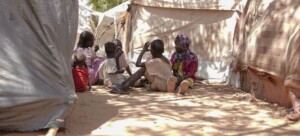COVID-19 is affecting Sudan’s poor health care system
Yesterday, the Sudanese Ministry of Health reported 31 new COVID-19 in the country as of Wednesday August 26, which are six less than the 37 new patients recorded on Tuesday. The UN Office for the Coordination of Humanitarian Affairs (OCHA) stated in its Situation Report on Thursday that the spread of COVID-19 is affecting Sudan’s already very poor health care system.
 Cartoon by Omar Dafallah (RD)
Cartoon by Omar Dafallah (RD)
Yesterday, the Sudanese Ministry of Health reported 31 new COVID-19 in the country as of Wednesday August 26, which are six less than the 37 new patients recorded on Tuesday. The UN Office for the Coordination of Humanitarian Affairs (OCHA) stated in its Situation Report on Thursday that the spread of COVID-19 is affecting Sudan’s already very poor health care system.
Four coronavirus patients died on Tuesday, among them a radiologist in Khartoum.
The total number of COVID-19 cases in Sudan, since mid-March when the first patient was registered, reached 13,082. 843 patients died and 6,594 recovered.
The majority of cases have been recorded in Khartoum: 9,344.
On Tuesday, the Sudan Doctors Central Committee mourned Professor Mirghani Osman, consultant of diagnostic radiology at the East Nile Hospital in Khartoum North, who died of COVID-19.
Early last month, the authorities in Khartoum decided to ease the measures taken in March and April to limit the spread of the coronavirus. Commercial and educational activities were allowed again, but the curfew from 18:00 until 05:00 remained effective. However, this measure is ignored to a large extent.
Health services
The spread of COVID-19 is affecting Sudan’s health care system, which had been under extreme stress prior to the pandemic, OCHA says in its Situation Report on Thursday.
“The system is straining to find the resources necessary to prevent, contain and treat COVID-19. Decades of inadequate investment, underfunding, poor infrastructure, limited qualified staff, poor equipment, insufficient medicines and supplies has weakened the system’s ability to respond to increased demands brought about by COVID-19 and other emergencies. The surveillance system does not cover the entire country and needs strengthening with long delays between alert and confirmation of an outbreak.
“Against this backdrop, health partners are operating in an environment where approximately 81 per cent of the population does not have access to a functional health centre within two hours walk from their home. These access gaps are a critical impediment to the fight against COVID-19, as well as people’s general well-being and survival from other risks and threats.
“Disruptions in services has been reported across the states due to closure of private health facilities as part of mitigation measures against the spread of COVID-19. Routine services in hospitals and other health facilities has been affected due to sporadic closures post confirmation of COVID cases and unavailability of medical staff.
“According to the 2018 Annual Health Statistics Report (AHSR) from the Federal Ministry of Health, there were 6,199 health facilities across Sudan, of which 260 were closed and not functioning prior to the pandemic. Of the working 5,939 health facilities, 523 were hospitals, 2,630 health centres, and 2,786 basic health units,” OCHA stated.
Radio Dabanga’s editorial independence means that we can continue to provide factual updates about political developments to Sudanese and international actors, educate people about how to avoid outbreaks of infectious diseases, and provide a window to the world for those in all corners of Sudan. Support Radio Dabanga for as little as €2.50, the equivalent of a cup of coffee.












 and then
and then